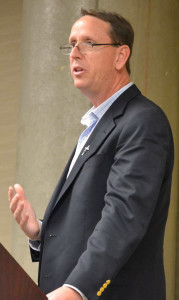Today, baseball is both a fun game for kids and a multi-billion-dollar business that helps distract adults from all the worries and stress of modern life.
But there was a time in the 19th and early 20th centuries when the sport was viewed as a way to reform the masses.
“People thought healthy bodies made healthy minds and a stronger moral character. And baseball kind of grew out of that,” said Dr. Thomas C. Henthorn, a Wyatt Professor of U.S. history at the University of Michigan’s Flint campus.

Henthorn is scheduled to give a talk at the Oxford Public Library on Monday, July 18 beginning at 7 p.m. The program is entitled, “Redeeming America with America’s Game: Baseball and Reform.”
Folks are invited to enjoy root beer and hot dogs as they listen to Henthorn discuss a history of the great American pastime that goes beyond the usual litany of statistics and anecdotes about the game’s legendary players.
Henthorn hopes people will walk away from his talk saying, “I never thought of it that way before.”
The game of baseball took shape during “a very tumultuous time” in American history, he said. During the 1800s, the nation went through an extremely bloody civil war and was undergoing a dramatic transformation in where and how people lived.
“Our communities (were) transforming,” Henthorn said. “They (were) growing from predominantly rural communities and small towns to large, disconnected cities.”
Add to this, an influx of immigrants who “look different, sound different and do weird things in their churches,” he noted.
All this led to a strong desire to change things and improve the population’s character. There were various ideas and movements designed to accomplish this.
“People (were) searching for all types of reform,” Henthorn said.
Sport was one of those ways.
Gambling, boxing, theater and the other leisure activities in cities, or “urban amusements” as Henthorn put it, were viewed as immoral.
Then along came baseball, which “seemed to be pure.”
“At least that’s what they tried to promote,” Henthorn said.
Baseball was to be a “morally uplifting” game for both players and spectators.
Henthorn said it was to be played by “the right people,” meaning “proper middle-class men,” who were to be “reserved” models of “self-control” that always exhibited good sportsmanship.
It was supposed to be a game of strategy where the goals were putting the ball in play, getting on base and highlighting fielding skills.
Baseball proponents of the 19th century wouldn’t recognize today’s game, according to Henthorn, where the batter’s use of “raw power” to hit home runs is celebrated and fans are eager to see balls sail over the fence.
“Baseball’s proponents would be a little aghast at that,” he explained. “To them, it would look more like boxing.”
Henthorn noted when baseball’s scoring system was developed in the 19th century, it did not include a way to score a baseball hit over the fence.
“It was an anathema to the game at that time,” he said.
As for baseball’s early fans, proponents of the game tried to make sure the stands were filled with “only certain types of people,” according to Henthorn. To accomplish this, ticket prices were raised and no alcohol was served.
Women were encouraged to attend, so as to have a civilizing effect on male fans.
“The proponents of baseball thought if women showed up to the games, the men would behave better,” Henthorn said.
Henthorn finds it interesting that many of the arguments used by advocates of youth sports today are essentially the same ones made by baseball’s 19th century proponents.
Today, youth are encouraged to participate in sports because there’s a commonly-held belief that it builds character and teaches responsibility and discipline.
“There’s actually no data to support that,” Henthorn said.
While “there’s some definite evidence that healthier people have more mental acuity,” he said, “there’s nothing,” except for “anecdotal evidence,” which is “very subjective,” that “says healthier people are more moral.”
“A lot of the ideas that we cherish are not really interrogated that well,” Henthorn noted. “We believe them because we want to believe them.”

Leave a Reply